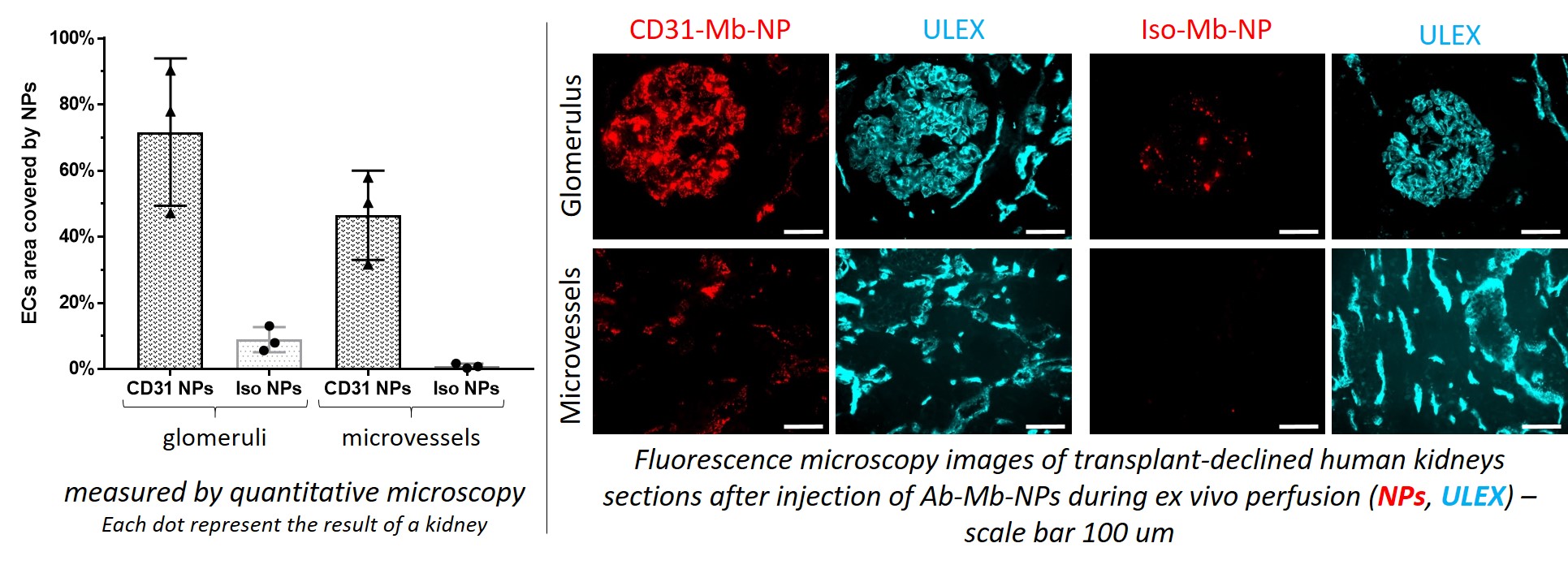Enhanced Delivery of Nanomedicine to Human Kidney During Ex Vivo Perfusion
1Yale University, new haven, CT, 2Perlmutter Cancer Center, New York University Langone Medical Center, New York, NY
Meeting: 2022 American Transplant Congress
Abstract number: 363
Keywords: Efficacy, Endothelial cells, Kidney, Machine preservation
Topic: Basic Science » Basic Science » 15 - Machine Perfusion and Organ Rehabililtation - Basic
Session Information
Session Name: Machine Perfusion and Organ Rehabililtation - Basic
Session Type: Rapid Fire Oral Abstract
Date: Monday, June 6, 2022
Session Time: 5:30pm-7:00pm
 Presentation Time: 6:00pm-6:10pm
Presentation Time: 6:00pm-6:10pm
Location: Hynes Ballroom A
*Purpose: An efficient delivery of therapeutic agents to graft endothelial cells (ECs) prior to transplantation could render organs more resistant to injury, improving clinical outcomes and increasing the number of transplantable organs. Targeted nanoparticles (NPs) delivered during ex vivo perfusion can allow specific and sustained delivery as well as elevated intracellular level of an encapsulated therapeutic. Here we describe a new and extremely efficient ECs targeting approach using an engineered synthetic binding protein, a “monobody” (Mb), as an adapter between antibodies (Abs) and NPs.
*Methods: We have developed a Mb that potently and selectively binds to the Fc region of an Ab isotype. A single cysteine that enables site-specific conjugation to NPs was introduced. Together, the Mb adapter enables the formation of Ab-Mb-NPs. Flow cytometry and quantitative fluorescence microscopy of dye-loaded NPs were used to measure efficiency of binding to ECs in vitro and ex vivo.
*Results: Ab-Mb-NPs demonstrated up to a 1000 fold increase in binding in vitro under flow compared to commonly-used Ab-NPs conjugated through amide bounding. This is attributed to a higher number of Abs attached and a better control of the Abs orientation leading to high retention of Abs function. The Mb approach also has the advantage of being readily adaptable to 1) different NPs compositions and 2) different Abs of the same species/isotype without re-engineering. When administered during ex vivo normothermic perfusion in three pairs of transplant-declined human kidneys, the targeted Ab-Mb-NPs were extremely efficient, covering ~72% of the ECs in the glomeruli and ~47% outside the glomeruli versus respectively ~9% and ~1% with the Isotype-targeted NPs. This is also significantly higher than the ECs coverage previously obtained with the Ab-NPs (conjugated through amide bounding) which was of ~20% in the glomeruli and ~1% outside the glomeruli.
*Conclusions: Mb-coupled conjugation has the potential to simplify and accelerate the development and clinical translation of nanomaterials to target graft ECs, opening opportunities to efficiently deliver therapeutics prior to transplantation.
To cite this abstract in AMA style:
Albert C, Bracaglia L, Koide A, DiRito JR, Lysyy T, Christopher E, Grundler J, Langford JT, Haakinson D, Pober JS, Saltzman WM, Koide S, Tietjen G. Enhanced Delivery of Nanomedicine to Human Kidney During Ex Vivo Perfusion [abstract]. Am J Transplant. 2022; 22 (suppl 3). https://atcmeetingabstracts.com/abstract/enhanced-delivery-of-nanomedicine-to-human-kidney-during-ex-vivo-perfusion/. Accessed February 28, 2026.« Back to 2022 American Transplant Congress

